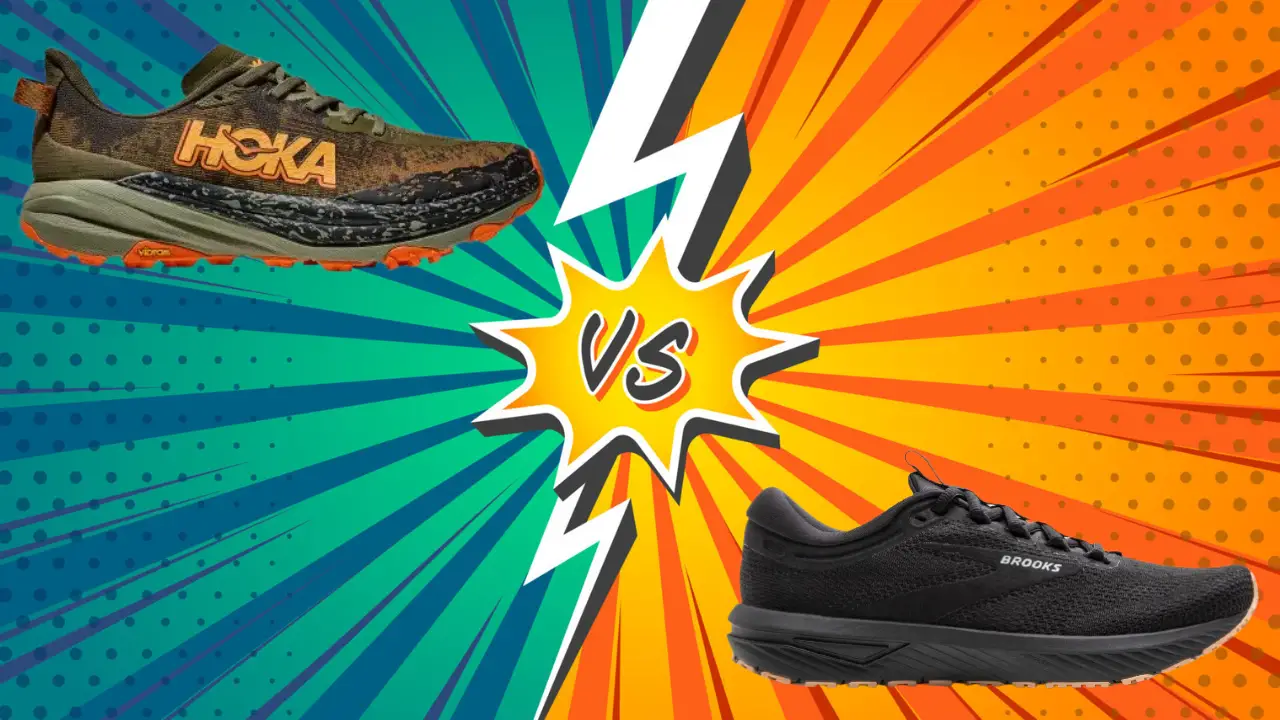Looking for your next perfect pair of running shoes but torn between trail and road warriors? Let’s dive into an in-depth comparison of the Hoka Speedgoat 6 and the Brooks Revel 7.
While these shoes serve different purposes, understanding their unique features and capabilities will help you make an informed decision that matches your running style and needs.
Key Takeaways:
- The Hoka Speedgoat 6 dominates trail performance with its Vibram® Megagrip outsole and protective features, while the Brooks Revel 7 offers excellent value for road running, making their ideal uses distinctly different.
- At $155, the Speedgoat 6 commands a higher price but justifies it with technical features, while the Revel 7’s $100 price tag makes it an attractive option for everyday road runners seeking reliability without premium features.
- The Speedgoat 6’s trail-specific design excels in off-road conditions but may feel overbuilt for urban use, whereas the Revel 7’s versatile design makes it perfect for daily road running and casual wear.
- Both shoes offer different heel-to-toe drops (Speedgoat: 5mm, Revel: 10mm), which significantly impacts their performance and suitability for different running styles and terrain types.
- For all-day comfort and casual use, the Revel 7’s lighter construction and standard cushioning prove more practical, while the Speedgoat 6’s robust build is best suited for dedicated trail activities.
Comparison Table:
| Feature | Hoka Speedgoat 6 | Brooks Revel 7 |
|---|---|---|
| Stability | Neutral with internal support chassis | Neutral |
| Flexibility | Moderate | High |
| Sizing | True to size with wider toe box | True to size |
| Weight | 9.80 oz | 9.1 oz |
| Cushion | Balanced cushioning with responsive foam | Standard cushioning |
| Outsole | Vibram® Megagrip with 5mm lugs | Standard rubber |
| Midsole | Lightweight responsive compound | Standard foam |
| Upper | Woven textile | Engineered mesh |
| Retail Price | $155 | $100 |
Features Comparison:
Material:
The Speedgoat 6 showcases premium materials with its Vibram® Megagrip outsole, providing exceptional grip on technical terrain. The lightweight woven textile upper offers superior breathability and durability.
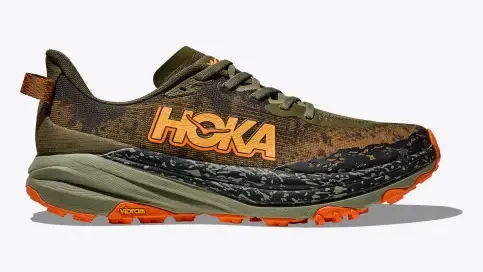
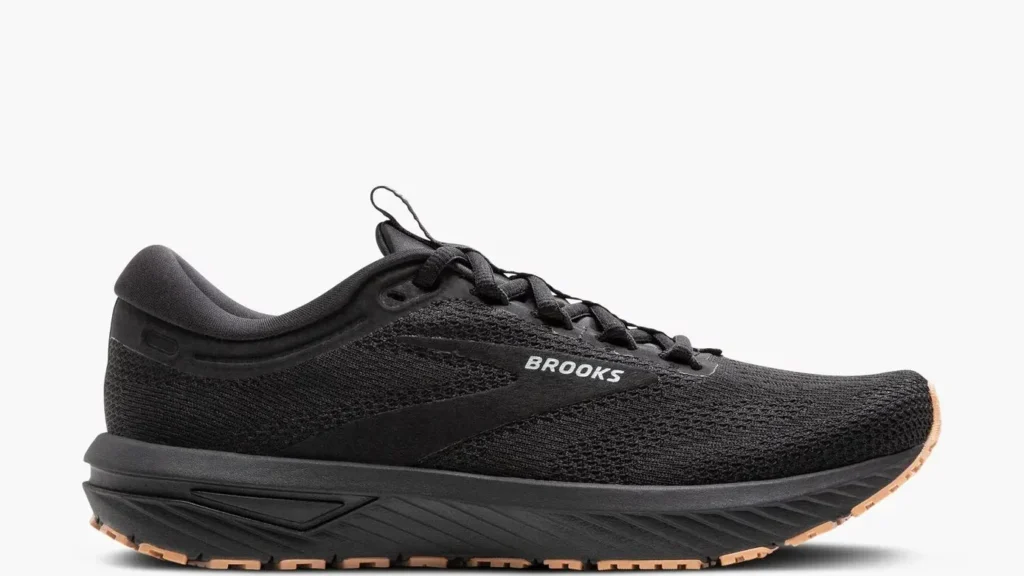
Meanwhile, the Brooks Revel 7 features a more straightforward construction with a standard rubber outsole and engineered mesh upper that’s both comfortable and functional.
Both shoes use quality materials, but the Speedgoat 6 clearly emphasizes technical performance with its trail-specific components.
Durability:
The Speedgoat 6 is built to withstand rough terrain with its reinforced construction and protective features like the toe bumper and internal support chassis. Trail testing shows excellent wear resistance on rocky surfaces.
The Revel 7, while durable for road use, isn’t designed for technical terrain. Its standard construction holds up well on paved surfaces but may show wear faster than the Speedgoat when used off-road. Both shoes maintain structural integrity appropriate for their intended uses.
Fit:
The Speedgoat 6’s fit is enhanced by its dual-sided gusseted tongue and dynamic vamp, providing a secure lockdown while allowing toe splay. The internal support chassis ensures stability without constriction.
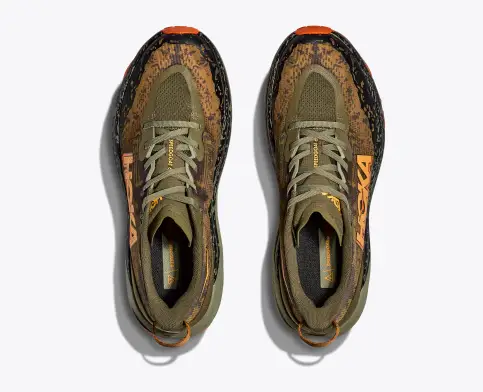
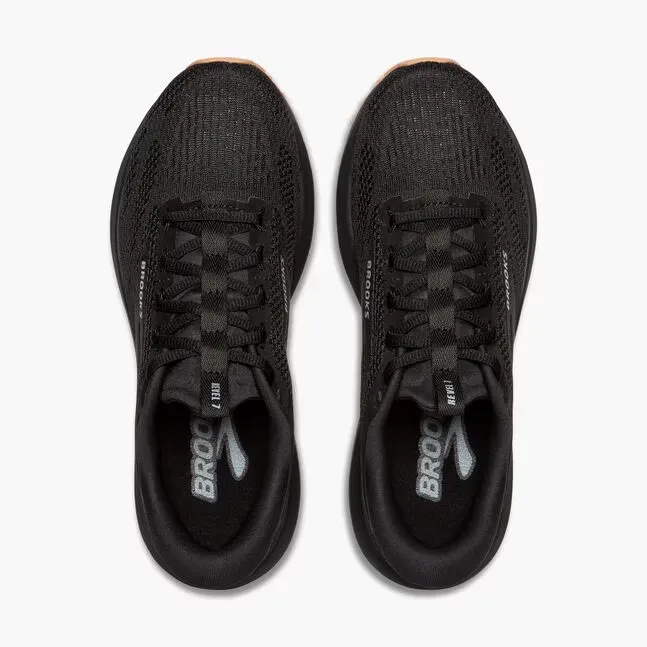
The Revel 7 offers a more traditional fit with its standard lacing system and comfortable upper. It’s slightly more forgiving in the midfoot area, making it suitable for everyday wear. Both shoes run true to size but serve different foot-strike patterns.
Cushioning:
Hoka’s proprietary foam in the Speedgoat 6 delivers a unique blend of protection and responsiveness, crucial for long trail runs. The balanced cushioning system effectively absorbs impact while maintaining ground feel.
The Revel 7’s standard cushioning provides adequate impact protection for road running, offering a more traditional feel. While both are comfortable, the Speedgoat’s cushioning system is more sophisticated and terrain-specific.
Stability:
The Speedgoat 6 achieves stability through its internal support chassis and wide platform design, crucial for technical terrain. The 5mm drop promotes natural foot positioning while maintaining control on uneven surfaces.
The Revel 7 offers basic stability features suitable for road running, with a higher 10mm drop that favors heel strikers. Both shoes are neutral but approach stability differently based on their intended use.
Value For Money:
At $155, the Speedgoat 6 justifies its price through specialized features and durable construction suitable for technical trails. The Revel 7, priced at $100, offers excellent value for road runners seeking a reliable daily trainer.
While the Speedgoat commands a premium, its technical capabilities make it worth the investment for trail enthusiasts. The Revel 7 provides outstanding value for road runners not requiring specialized features.
Performance Testing:
For Walking:
The Speedgoat 6 excels in off-road walking scenarios, providing exceptional stability and grip on various surfaces. The protective cushioning and secure fit make it comfortable for extended hiking sessions.
The Revel 7 proves more suitable for urban walking, offering good comfort on paved surfaces without the unnecessary bulk of trail features. For casual walking, the Revel 7’s lighter weight and simpler design might be more practical.
For Running:
On technical trails, the Speedgoat 6 shines with its aggressive lugs and responsive cushioning, providing confidence at various speeds. The protective features really prove their worth during longer trail runs.
The Revel 7 performs admirably on roads, offering smooth transitions and adequate cushioning for daily training. However, it’s important to note that each shoe strictly excels in its intended environment.
For Standing All Day:
The Speedgoat 6’s balanced cushioning and stable platform provide excellent support for prolonged standing, though it might feel overbuilt for indoor use.
The Revel 7’s more conventional cushioning and lighter design make it a better choice for all-day wear in urban settings. Its breathable upper and standard cushioning provide adequate comfort without feeling excessive.
For Plantar Fasciitis:
Both shoes offer different approaches to plantar fasciitis support. The Speedgoat 6’s comprehensive cushioning system and secure fit provide excellent arch support and impact protection.
The Revel 7’s standard cushioning and flexible platform might suit runners who prefer less structured support. Neither shoe is specifically designed for plantar fasciitis, but both can be suitable depending on individual needs.
Conclusion: Which Is Better For You
The choice between these shoes ultimately depends on your primary running environment and needs. The Speedgoat 6 is the clear winner for trail running and technical terrain, justifying its higher price through specialized features and durability.
The Revel 7 excels as a versatile road running shoe, offering excellent value for daily training and casual wear. Consider your running surface, planned activities, and budget when making your decision.

